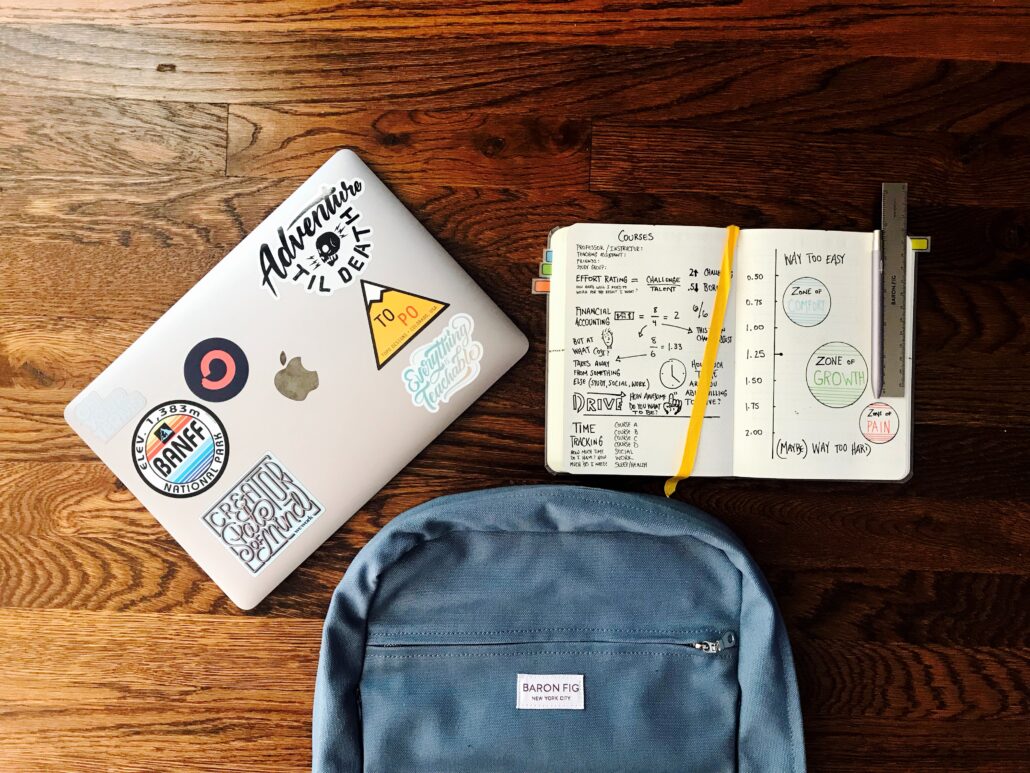It’s almost time for the new academic year to start. Every upcoming school year brings new opportunities for growth, new skills, and experiences. That’s why in this article we will explore everything you need to know about the new days at school.
Follow these tips to help your kids get back to school. Let’s make this semester the best ever. Whether it’s about organising the new working space, the new daily habits, or the nutrition plans.
Going back to school is an amazing time for students; it may sometimes be hard, but it also hides plenty of new possibilities and new beginnings. It’s about time to make new friendships, set new goals, and gain knowledge and skills. So, read below and join us on the exciting back-to-school journey!
List of 25 Back To School Tips
1. Prepare your supplies in advance
Organizing your new school materials before school starts can help you start the year successfully. Preparing the new supplies before the starting day will save you from any stress and rush.

You can begin by making a list of your essential supplies, such as notebooks, paints, pencils, pens, erasers, rulers, calculators, and any other items your teacher may ask for. Review your existing supplies and note what needs to be replaced or what you need to buy for the first time.
Your list can help you stay organized and decide which items to purchase and where is possible to find them. To ensure that school supplies last throughout the entire school year, they should be durable and made of high-quality materials.
PRO TIP – Don’t forget to keep your school supplies organized and easily available by using a specific backpack or bag.
Furthermore, labeled storage containers, folders, or dividers can be used to sort them by subject or category if needed. Of course, keeping your workspace clean and tidy will help you be more organized and to ensure that nothing is missing.
Moreover, having everything in place will increase your confidence, allowing you to concentrate on your studies and actively participate in class. Start the year on the right foot by gathering your supplies and getting organized!
2. Set goals for the upcoming year
Setting goals for the upcoming year is an empowering practice that sets the scene for personal growth and achievement. By taking the time to define your aspirations and intentions, you create a roadmap to guide your actions and shape your future.
When setting goals it’s essential to make them clear and measurable. Clearly communicate what you want to achieve and establish milestones to track your progress. This transparency brings focus and direction to your efforts, allowing you to stay motivated and committed.
In order to achieve your ambitions in a balanced and healthy manner, think about setting goals for different areas of your life: your personal life, your academic life, your career life, and your health goals.
Additionally, it’s essential to make your goals realistic and attainable. While it’s important to aim high, setting unrealistic expectations may lead to frustration and disappointment. Break down larger goals into smaller, actionable steps to make them more manageable and increase your chances of success.
Regularly revisit and review your goals to stay on track. This allows you to assess your progress, make any necessary adjustments, and celebrate accomplishments along the way. Stay flexible and open to adapting your goals as circumstances change or new opportunities arise.
By setting goals for the upcoming year, you build a sense of purpose and create the road toward personal fulfillment. Setting goals also empowers you to take control of your life, make deliberate choices, and work towards becoming the best version of yourself. So, dream big, set your goals, and embark on an exciting journey of growth and accomplishment.
3. Establish a routine
Setting up a daily routine is a crucial step in getting back into the school year. As summer break ends, it’s important to gradually reintroduce structure into your daily life. By creating a routine, you can make the shift from the holidays to the new school year smoother and it will also help you set yourself up for success.
First of all, make sure you wake up and go to bed at the same time every day. Instead of abruptly changing your sleep schedule, ease into it gradually by adjusting your bedtime and wake-up time. This allows your body to adapt naturally and prevents you from feeling groggy.
Advantages of having a sleeping schedule
| Sleeping at the same time and waking up helps your body to regenerate as it gets used to the hours and schedule | Some studies showed you actually get sick less when you have a sleep schedule |
| Reduces stress and improves mood in general | Helps you stay at a healthy weight |
| Higher quality rest ( compared to sleeping in random times ) | Falling asleep faster |
By allocating specific time slots for each of these things, you can better manage your time and ensure everything gets done. Routines aren’t just for sleeping.
Don’t forget to find some time for yourself and relaxation! Whether it’s reading a book, going for a walk, or enjoying a hobby, taking care of yourself is essential for maintaining a healthy balance.
Remember, routines should be flexible. Life can be unexpected sometimes, and it’s important to adapt when needed. The key is to find a balance between sticking to your routine and being open to necessary adjustments.
By establishing a routine, you’ll create stability and order in your life. You’ll find it easier to focus on your schoolwork and responsibilities, and you’ll have a smoother transition into the school year. So take the time to set up a routine that works for you, and get ready to tackle the challenges.

4. Review previous lessons
One more valuable back-to-school tip is to review previous lessons before starting a new school year. Taking the time to revisit and refresh your understanding of all that you have learned till now, can greatly contribute to your academic success.
Reviewing previous lessons can help you in many ways. It helps reinforce important concepts, ensuring that you have a solid foundation to build upon. It also allows you to identify any areas of weakness or gaps in your knowledge that may need additional attention. By addressing these gaps early on, you can prevent future difficulties.
In addition, you can start by going through your old notes and textbooks and reviewing key points and summaries. Take advantage of online resources or educational apps that provide interactive quizzes or practice exercises to test your understanding. Consider seeking help from classmates or teachers to discuss and clarify any challenging topics.
By reviewing frequently, you’ll improve your comprehension and boost your confidence. You’ll be able to approach new lessons with a sense of familiarity and build upon what you already know.
Remember that reviewing previous lessons is not about remembering information, but about reinforcing your understanding of the subject. Take your time, break down complex topics into smaller ones, and fill any possible gaps.
By making it a habit to review previous lessons, you set yourself up for a successful academic year. You’ll feel more prepared and confident and will be able to face any new challenges.
So, take the opportunity to review and refresh your knowledge—it’s a smart strategy for back-to-school success.

5. Organise your backpack
Organizing your backpack and locker saves you time, reduces stress, and makes sure you always have the materials you need.
Start by cleaning your backpack and locker. Remove any unnecessary items or outdated materials that may be taking up space. Don’t keep anything more than the essentials.
The essential materials for your backpack may be anything like a notebook, writing utensils, and pencil case, etc. This helps lighten the load and prevents items from getting mixed.
Next, set a system for organizing your belongings. Use folders, or pouches to separate and categorize different items. Assigning specific pockets or sections for different subjects or materials will help you to maintain order. Labeling or color-coding can also be helpful for quick identification.
Regularly clean out and tidy up your backpack and locker as well as throw away any trash, recycle papers you no longer need, and reorganize items that have been misplaced. This practice ensures that your spaces remain well-organized and functional throughout the school year.
By organizing your backpack and locker, you establish a sense of order and preparedness and of course, will help you spend less time searching for materials and more time focusing on your studies. Plus, an organized space promotes a positive mindset and reduces distractions.
So, take the time to check your backpack, establish an organizational system, and maintain cleanliness in your backpack and locker.
6. Planning your outfits
Planning your outfits is a practical and time-saving back-to-school tip that can make your mornings smoother and relieve unnecessary stress. By taking a few moments to plan your outfits in advance, you can start each day feeling confident and prepared.
Begin by considering the weather forecast for the week ahead. This will help you select appropriate clothing that suits the conditions and ensures your comfort throughout the day. Get prepared for any special events or activities you may have, such as physical education classes or presentations.
Lay out your chosen outfits for each day of the school week or you can even try mixing and matching different pieces to maximize your wardrobe options.
Consider the practicality and comfort of your outfits, especially if you have a long day ahead.
Make sure you don’t sacrifice creativity or spontaneity when planning your outfits. You can always make adjustments or add personal touches to your planned outfits on the day itself. The goal is to start your day smoothly and confidently, so you need to know what you’ll wear.
By planning your outfits, you’ll have more time to focus on other important tasks and activities, ensuring a positive start to each school day. So, if you take a few moments to plan ahead, you will express your personal style without getting stressed.

7. Meet your teachers
Taking the time to introduce yourself and create a positive connection with your teachers is a supportive learning experience. By trying to meet your teachers and organize greet sessions you’ll have the chance to ask any questions you may have and address any concerns, helping to create a solid basis for communication.
Try to introduce yourself personally to each teacher during the first few days of school. Approach them before class, express your enthusiasm for learning, and share a brief introduction about yourself. This simple act showcases your commitment to your education and demonstrates respect for your role as an educator.
Actively participate, ask thoughtful questions, and demonstrate a genuine desire to learn. These actions not only show your teachers that you are dedicated to your studies but also contribute to a positive classroom environment.
Making a connection with your teachers ensures effective communication, collaboration, and a supportive learning environment. Therefore, make it a priority to connect with them – they are valuable allies in your educational journey.
8. Set up a studying space
You can improve your focus and productivity by setting up a study space at home. Setting up a study space will help create an ideal environment for learning and establish a routine that will help you succeed.
Moreover, you can find a quiet area in your home that is distractions free like a corner in your room or a desk in a dedicated study area. Ensure that the space is comfortable and organized, with enough room for your study materials and a comfortable chair.
Additionally keep essential study supplies within reach, such as pens, paper, textbooks, and a computer if needed. This saves you time from searching for items and helps maintain focus during study sessions.
Consistency is key to developing effective study habits so stay focused, minimize distractions by turning off notifications on your electronic devices, and let your family members know when you need uninterrupted study time.
Ensure that your study space is bright to prevent eye strain and maintain your concentration. The ideal light is the natural one but if that’s not possible, use a desk lamp or adjustable lighting to create a well-lit environment.
By setting up a study space at home, you create a dedicated area where you can focus, learn, and excel academically. This sends a signal to your brain that it’s time to study and helps you develop a sense of discipline and study routine.
9. Pack nutritious lunch
A completed and correct diet is one of the most important ways to improve your focus and the rest of your brain. Having a nutritious lunch every day will make a big difference to your performance and well-being overall.
When packing your lunch, ensure you make a balanced diet including lean sources of protein such as grilled chicken, turkey, or legumes to support brain rest and repair.
Consume more whole grains, by adding to your diet more brown rice, whole wheat bread, or quinoa. Of course don’t forget to include fruits and vegetables for more vitamins, minerals, and fiber.
Additionally, you can avoid processed and sugary foods, as they can lead to energy crashes and decreased concentration. You can make your lunch more nutritious with good fats like nuts, seeds, olive oil, or avocado.
Prioritize your health and your well-being, with healthier lunches every day. Always try to invest some time in planning and preparing a lunch that fuels your body with the nutrients it needs, and reap the benefits of improved focus, energy, and overall academic success.
10. Stay hydrated
Drinking plenty of water is important that often gets overlooked but has a significant impact on your health and academic performance.
You can have a reusable water bottle with you all day, so you’re reminded to stay hydrated, regardless you’re thirsty or not, and drink water regularly.
Dehydration can negatively affect your energy levels and cognitive abilities.
During the school day, take advantage of water breaks or opportunities to refill your water bottle. If permitted, keep a water bottle at your desk or in your backpack so you can hydrate whenever needed. By prioritizing hydration, you can combat fatigue and stay alert and focused in class.
To make staying hydrated more enjoyable, consider infusing your water with fresh fruits or herbs for a burst of flavor. You can try adding slices of lemon, cucumber, or berries to enhance the taste and make drinking water more appealing.
It’s important to note that water is the number 1 choice for hydration. While sugary drinks like soda or energy drinks might provide a temporary boost, they can lead to energy crashes and interfere with concentration.
By staying properly hydrated, you give yourself an advantage in the classroom. So, make hydration a priority by carrying a water bottle, and drinking regularly. Your body and brain will thank you for it.

11. Staying connected with classmates
Staying connected with classmates is a valuable tip that can enhance your overall school experience and socialize you.
Building positive relationships with your friends not only contributes to a supportive and inclusive learning environment but also opens doors to new friendships and opportunities.
During the first days of school is important to introduce yourself to your classmate. In this way, you get involved with group activities, discussions, and collaborations.
Additionally, you can use social media platforms to stay connected outside of the classroom. Join online class groups or discussion forums where you can share ideas, ask for help, or engage in academic discussions. Engaging in shared activities can lead to lasting friendships and provide a sense of belonging within the school community.
Always be inclusive and welcoming to others. Offer support and help to classmates who may be struggling academically or socially. By being kind and compassionate, you create a positive and supportive atmosphere that benefits everyone.
Maintaining connections with classmates can also be beneficial for academic purposes. Collaborating on group projects, studying together, or forming study groups can enhance your learning experience and improve your understanding of the material.
By staying connected with classmates, you create a network of support, foster a sense of community, and enrich your school experience. The connections you make can positively impact your social and academic growth throughout the school year.
12. Review your class schedule
Reviewing your class schedule will help you stay organized, manage your time effectively, and avoid missing any important classes or activities. To begin, carefully examine your schedule, taking note of the days, times, and locations of each class.
Also, be sure to note any breaks or gaps between classes and think about how you can best use that time. Don’t forget to pay attention to any special requirements or materials needed for specific classes.
Once you have a clear understanding of your schedule, create a visual representation, like a timetable or planner, that you can refer to regularly. This will help you plan your study time, extracurricular activities, and other responsibilities.
Be sure to also look out for any potential conflicts or overlaps in your schedule. If you notice any issues, promptly reach out to your teachers or school administrators to find solutions or make necessary adjustments.
Lastly, review the syllabus or course outlines provided by your teachers so you can prioritize your study efforts and stay on top of assignments, projects, and exams.
With a clear understanding of your academic commitments, you’ll be able to manage your time proactively, stay organized, and make the most of your educational experience. So, take the initiative to review your schedule and start the year with confidence and preparedness!

13. Use a planner or digital tools
Staying organized during the school year can be made easier by using a planner or digital tools. Whether you prefer a notebook or a digital app, is essential to find a system that works for you in order to manage your time assignments and extracurricular activities.
You can also consider color-coding different subjects or activities to further streamline your planning process. Alternatively, digital tools such as calendar apps or productivity apps offer convenience and accessibility.
With these tools, you can easily stay on track with your schedule, set reminders, and receive notifications for upcoming deadlines or events. Whichever method you choose, make it a habit to consistently update your planner or digital tools with assignment due dates, exam dates, extracurricular activities, and any other commitments.
Regularly reviewing your planner helps you stay aware of upcoming tasks and prevents them from slipping through the cracks. Using a planner or digital tools can reduce stress and increase productivity while effectively managing your time, allocating resources, and maintaining a healthy work-life balance.
Consider investing in a planner or exploring digital tools that suit your preferences and make them an integral part of your back-to-school routine.
14. Take breaks
The most important tip is taking breaks, which plays a crucial role in maintaining productivity, focus, and overall well-being. Although it may be tempting to power through long study sessions without pause, doing so can lead to mental fatigue and decreased efficiency.
Regularly taking breaks into your study routine is essential for optimizing learning and maintaining a healthy balance.
To effectively study or work on tasks, set intervals of focused work followed by short breaks. It’s also important during these breaks, to step away from your study area, to stretch, take a walk, or engage in activities that relax and recharge your mind.
Breaks provide an opportunity for your brain to process information and recharge, leading to improved concentration and retention.
One more tip is to use breaks effectively by avoiding distractions from electronic devices or mentally draining activities. Instead, engage in activities that promote relaxation, such as deep breathing exercises, listening to music, or practicing mindfulness.
Remember, the quality of your study time is just as important as the quantity. By incorporating regular breaks, you can optimize your study sessions, enhance your learning experience, and take care of your well-being.
Make it a habit to prioritize breaks and give yourself the necessary mental and physical rejuvenation to excel academically and maintain a healthy balance throughout the school year.
15. Find extracurricular activities
Another tip is to find extracurricular activities that are its something can enrich your overall school experience and contribute to personal growth and development. Getting involved in activities outside of the classroom allows you to explore your interests, develop new skills, and build lasting friendships.
You can start by researching the extracurricular options available at your school. Consider visiting clubs, sports teams, music ensembles, and theater groups, or get involved with community service organizations that align with your passions or hobbies.
These activities are also developing leadership skills, teamwork, time management, and discipline.
Furthermore, extracurricular involvement can also enhance your college or job applications. Admissions officers and employers often look for well-rounded individuals who have demonstrated their commitment, passion, and skills beyond academic achievements.
Engaging in activities showcases your ability to manage multiple responsibilities and demonstrates your dedication to personal growth.
Don’t forget to prioritize your studies while allocating time for your chosen activities. It’s important to manage your time effectively and avoid overcommitting yourself.
Explore the available opportunities, step out of your comfort zone, and embrace the extracurricular activities that resonate with you. Your involvement will enhance your school journey and help shape you into a well-rounded individual.

16. Communicate with your parents
Your academic success and overall well-being can greatly be enhanced by communicating with your parents before school starts. You can receive support and guidance from your parents if you have open lines of communication with them regarding your educational journey.
Regularly update your parents on your school activities, assignments, and progress. Share your achievements, challenges, and any concerns you may have. This dialogue allows your parents to stay informed and offer assistance when needed.
Discussing your goals and aspirations with your parents can also foster a sense of accountability. By sharing your ambitions, they can support you in setting realistic targets, creating action plans, and tracking your progress. As long as they guide and encourage you, you’ll have the motivation to work towards your goals and remain focused.
Additionally, involving your parents in your school life enhances their understanding of your unique educational needs. If you require any accommodations, additional resources, or support, open communication allows your parents to collaborate with teachers and school staff to ensure your needs are met.
Keeping a respectful and constructive dialogue with your parents is important. Always remember that communication is two-way. Listen to what your parents have to say, and respect their viewpoints and concerns.
17. Practice time management
Developing time management skills can help students achieve academic success while maintaining a healthy lifestyle. With many responsibilities and tasks to handle, it’s critical to prioritize time management skills.
First and foremost, create a schedule or use a planner to outline your daily and weekly commitments. Your time will be visually represented, allowing you to plan your study, class attendance, extracurricular activities, and downtime.
Moreover, it is important to prioritize tasks based on urgency and importance. Identify key deadlines and work backward, leaving ample time for researching, writing, or studying.
By breaking larger projects into smaller, manageable tasks, you’ll avoid procrastination and feel more accomplished along the way.
Eliminating distractions is another essential aspect of effective time management. Find a quiet study space, turn off notifications on your electronic devices, and resist the temptation to constantly check social media.
Maintaining focus during dedicated study periods will help you make the most of your time and retain information more efficiently.
In addition, a well-rested mind is more productive and better equipped to tackle academic challenges, so remember to schedule time for relaxation, hobbies, and quality time with your loved ones.
By implementing these time management strategies, you’ll set yourself up for success, reduce stress, and find a healthy balance between academics and personal life. Embrace the new school year with confidence and make the most of your valuable time.

18. Use available resources
One essential tip for a successful return to school is to utilize the wealth of available resources. Whether it’s the school library, academic support services, or online tools, these resources can greatly enhance your learning experience.
Find out what books, reference materials, and online databases are available at your school or local library.
They offer a wealth of knowledge across various subjects. Take advantage of academic support services like tutoring programs, writing centers, or study groups. These resources can provide valuable guidance, help clarify concepts, and improve your study skills.
Discover educational apps and online platforms that offer interactive study guides, tutorials, or videos. They can make learning more engaging and efficient. Additionally, foster a relationship with your teachers or professors.
They are valuable resources that can provide insights, answer questions, and recommend additional reading materials. Collaborate with your classmates and form study groups to share resources, notes, and ideas.
19. Stay motivated
Discover your passions and align your studies with subjects that genuinely interest you. Motivating yourself comes naturally when you have genuine curiosity and excitement about the subject matter.
You should surround yourself with positive influences and friends, family members, and mentors who inspire and motivate you to succeed.
Additionally, create a system of rewards for achieving your goals or completing challenging tasks. Treat yourself to small indulgences or enjoyable activities as a way to acknowledge your efforts and stay motivated.
You can also find inspiration from role models or success stories in your field of interest. Their achievements can serve as a powerful source of motivation and remind you of the possibilities within your reach.
By implementing these strategies and cultivating a resilient mindset, you can sustain your motivation throughout the school year and achieve your academic goals. Stay focused, persevere through challenges, and embrace the joy of learning.
20. Reward yourself
Rewarding yourself is often overlooked but it’s an essential aspect of maintaining motivation and a positive mindset throughout your academic journey. Using it is an effective way to acknowledge and celebrate your efforts and stay motivated.
You can start by treating yourself with a favorite meal when you reach a milestone, indulge in a hobby you love, or spend time with your loved ones. By celebrating these smaller accomplishments, you create a positive cycle of motivation and reinforce your progress.
Creating a rewards system can also be incredibly effective. Set specific targets or tasks, and assign rewards for their completion. For instance, after finishing a challenging assignment, allow yourself a designated amount of time for relaxation or engage in an activity you truly enjoy.
In addition to tangible rewards, don’t underestimate the power of self-care rituals as a form of reward. Incorporate regular self-care activities into your routine to rejuvenate and recharge yourself.
Remember, the key to effective rewards is personalization. Choose rewards that are meaningful and enjoyable to you.
By incorporating a reward system into your academic journey, you not only stay motivated but also create a positive mindset and a sense of fulfillment. So, celebrate your achievements and reward yourself along the way. You deserve it!

21. Set realistic expectations
Setting realistic expectations is crucial for a successful back-to-school experience. It’s essential to recognize your strengths and limitations and establish goals that are attainable within your capabilities.
By doing so, you can avoid unnecessary stress and disappointment while maintaining a healthy balance in your academic and personal life.
When setting expectations, consider your workload, extracurricular activities, and other commitments. Be honest with yourself about the amount of time and effort you can realistically dedicate to your studies.
Setting overly high expectations can lead to burnout and affect your overall well-being. Instead, focus on achievable goals that challenge you without overwhelming you.
Furthermore, it’s important to remember that everyone’s journey is unique. Comparing yourself to others can create undue pressure and hinder your progress.
Rather than striving to meet someone else’s standards, concentrate on your personal growth and improvement. Celebrate your accomplishments, no matter how small they may seem, and acknowledge that progress takes time.
By setting realistic expectations, you can create a positive and manageable academic experience. It allows you to maintain a healthy perspective, make the most of your abilities, and find joy in the learning process. Embrace your individuality and strive for personal growth, and you’ll pave the way for a successful school year.
22. Take care of your mental health
Taking care of your physical and mental health significantly impacts your ability to learn, concentrate, and excel academically. First and foremost, get enough sleep to recharge your batteries.
Establish a consistent sleep routine that allows you to get the recommended hours of rest for your age group. A good night’s sleep works wonders for memory, concentration, and overall cognitive function.
Remember to nourish your body and mind with a balanced diet. Treat yourself to wholesome meals packed with a colorful variety of fruits, vegetables, whole grains, and lean proteins.
Limit sugary snacks and caffeinated drinks, as they can lead to energy crashes and difficulty focusing.
Don’t forget the power of physical activity! Include enjoyable exercise in your daily routine to keep both your body and mind in top shape. Whether it’s going for a walk, dancing around your room, or playing your favorite sport, aim for at least 30 minutes of activity most days of the week.
Lastly, be kind to your mental well-being. Take breaks and practice stress-management techniques like deep breathing or mindfulness to reduce anxiety and promote relaxation.
Remember, reaching out to supportive friends, family, or a school counselor is always a great option if you need someone to talk to.
By making self-care a priority, you’ll be setting yourself up for success. Taking care of your health is not only beneficial for your academic performance, but it also contributes to your overall happiness and well-being. So, remember to give yourself the care and attention you deserve as you embark on this new school adventure.
23. Participate in class
Active class participation is a key factor in maximizing your learning experience and success as you head back to school. Engaging in classroom discussions, asking questions, and actively involving yourself in activities can greatly enhance your understanding of the subject matter.
Here are a few tips to encourage participation:
Firstly, be present both physically and mentally. Arrive on time and be prepared with the necessary materials. Actively listen to the teacher and your classmates, and show enthusiasm for the topics being discussed.
Secondly, don’t hesitate to ask questions. If something is unclear or you need further clarification, raising your hand and seeking a better explanation can provide valuable insights and deepen your understanding.
Moreover, contribute to discussions and share your thoughts and ideas. Don’t be afraid to express your opinions respectfully and engage in meaningful conversations with your peers. Active participation fosters critical thinking and encourages diverse perspectives.
Furthermore, working with others allows you to learn from different viewpoints, develop teamwork skills, and expand your knowledge through shared experiences.
The last one you can consider is joining clubs or volunteering for class presentations. These opportunities offer additional chances to learn, grow, and showcase your abilities.
By actively participating in class, you can create an engaging and dynamic learning environment. It demonstrates your eagerness to learn, fosters deeper understanding, and builds confidence in expressing your ideas.
So, embrace the classroom as a space for active involvement, and reap the benefits of an enriched educational journey.
24. Practicing self-reflection
Celebrating your accomplishments no matter how small they may seem is a great start for self-reflection. Identifying areas for improvement is another way to seld reflection.
Reflect on challenges you faced, subjects that require more attention, or study strategies that didn’t yield desired results. By acknowledging these areas, you can create a plan to address them and set goals for self-improvement.
Additionally, consider your learning experiences and how they can be enhanced. Reflect on what teaching methods, study techniques, or environments work best for you. Explore new approaches and experiment with different strategies to optimize your learning process.
One more thing you can do is embrace mistakes as learning opportunities. Reflect on setbacks or failures, analyze what went wrong, and identify lessons learned. Embrace a growth mindset and view setbacks as stepping stones toward improvement.
By practicing self-reflection, you gain valuable insights about yourself as a learner and an individual. It fosters self-awareness, promotes personal growth, and empowers you to make informed decisions about your education. So, make self-reflection a regular practice and embark on a journey of continuous improvement and success.

25. Embrace challenges
Embracing challenges is a key mindset for a successful back-to-school experience. Rather than shying away from difficulties, choosing to face them head-on can lead to growth, resilience, and personal development.
Adopting a growth mindset will help you believe that challenges are opportunities for learning and improvement. Embrace the belief that your abilities can be developed through dedication and effort, rather than seeing them as fixed traits.
You can also, view challenges as exciting chances to expand your knowledge and skills, rather than overwhelming obstacles. Embracing challenges with enthusiasm and curiosity can fuel your motivation and drive.
Keep always in mind that seeking help from teachers, classmates, or mentors will help you stay on track and to make sure that have a complete understanding of what you have been asking.
One more tip is to learn from setbacks and mistakes. Embrace the opportunity to reflect on what went wrong, identify lessons learned, and use that knowledge to adjust your approach. Remember that setbacks are not failures but stepping stones toward growth.
By embracing challenges, you develop resilience, adaptability, and a positive mindset. Each challenge you face becomes an opportunity for personal and academic growth. So, step out of your comfort zone, face challenges with determination, and watch yourself soar to new heights of achievement.
These 25 back-to-school tips can get you organized and on track, making sure that your productivity for the new school season will be boosted to the maximum. Lastly, you need to remember that you should always stay committed to your goals and the rewards will be extremely valuable for your future.

